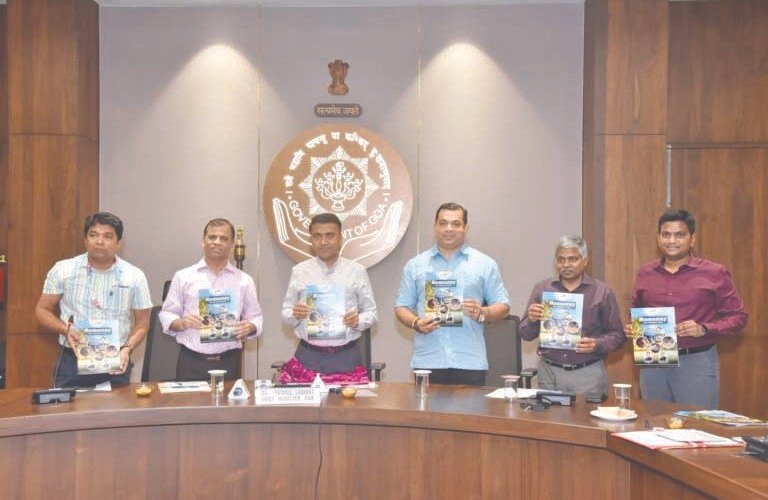
The Goa government launched a Homestay and Bed and Breakfast (B&B) policy in October with the aim of promoting the State beyond its popular sand and sea
Along with the Homestay and Bed and Breakfast (B&B) policy, a Caravan Tourism policy has been introduced recently. Both policies were announced by Chief Minister, Dr Pramod Sawant and those present at the event included Rohan Khaunte, Minister for Tourism; Dr Chandrakant Shetye, Member of Legislative Assembly; Dr V. Candavelou, IAS, Principal Secretary (Finance); and Srinet Kotwale, Acting Director of Tourism, and others.
Dr Sawant said that these policies will provide the opportunity to exhibit Goa’s natural beauty, culture, as well as age-old traditions that have been practised across generations and that they will help to create jobs and boost the economy. He further said that women entrepreneurs should derive maximum benefit of the Homestay policy and that both policies will help to attract tourists to Goa’s hinterland; he also appealed to people to avail the benefits of the policies. Dr Sawant emphasised that the Goa government is deliberating over a policy that will help to promote and regulate activities of adventure tourism within Goa.
The Homestay policy will help to promote the hinterlands of Sattari, Dharbandora, Sanguem, Bicholim, Ponda, Quepem and Canacona. The Caravan policy, on the other hand, will call for operators to carry out the venture of recreational vans. The document also states that caravan parks will be established which will include facilities like vehicle charging points, utilities, sanitation services, and the like.
The Homestay and B&B Policy
The Policy includes eight objectives – streamlining the registration and regulation of homestays and B&B operations in the State; augmenting the supply of accommodation units to cater to the growing demand within Goa; enhancing livelihood opportunities, up-skilling and creating self-employment opportunities for rural residents and communities with high tourism potential within hinterlands; improving standards of service delivery and ensuring best quality of services and facilities for tourists; preserving Goa’s cultural ethos, natural landscape, cuisine, historical heritage, and traditional activities while introducing the same to tourists; preserving old houses and mansions with unique Goan architectural blend; creating a market for locally-sourced goods and services; and lastly attracting responsible tourists along with promoting unique experiences through hinterland tourism in the State.
Eligibility
The document lists out four criterions for homestays and B&Bs to be eligible for registration. Firstly, the homestay/B&B establishment should have a minimum of two-six rentable rooms. Secondly, these services need to be registered legally as a whole residential unit with the Tourism Department.
Thirdly, it is necessary for the owner of these facilities to reside at the establishment along with their family, otherwise a designated agent/operator will be required to stay within the premises of the establishment to look after and arrange for services of hospitality. Moreover, the owner will have to also compulsorily make use of TIME software that has been developed by Goa Electronics Ltd.
Major Monetary Benefits
The first hundred homestays and B&B establishments that are registered with the Department of Tourism, and have completed a year of operations shall be eligible for reimbursement of registration fee of Rs 1,000 for the first year, while homestays registered previously with the Tourism Department prior to the term of the policy, shall avail the reimbursement on the renewal fee. Expenditure of up to Rs 2 lakhs on furniture and furnishings that have been purchased from the vendors that are recorded with the Department of Handicraft, Textiles and Coir, Government of Goa, will be reimbursed as well. The policy also states free participation of one homestay and one B&B establishment at a maximum of one domestic trade show in a calendar year, with reimbursement of up to Rs 50,000 on travel and accommodation expenses. These perks will be applicable during the tenure of policy.
Anirudh Agrawal, Chairman, Confederation of Indian Industry (CII), stated that, “The homestay and caravan policies by the tourism department are a step in the right direction. The framework will be an asset to entrepreneurs looking to venture into new tourism services, something which Goa desperately needs to match its ambition of outgrowing the beach tourism tag.” He further said that, “While the homestay policy will empower smaller local communities to participate in the tourism sector, thereby making Goa’s approach more inclusive, the caravan policy will feed into both adventure and hinterland tourism. These policies will now increase Goa’s tourism products that can showcase new facets of this beautiful state.”
Devidas Velip, Sarpanch of Barcem-Quedem said that, “Barcem is a rural area and there is no specific source of income for the villagers. We as a panchayat try to promote tourism through the local waterfall. This initiative will help people to earn additional income and promote tourist spots in and around the village. Local women can also start their small businesses once people start visiting our villages.”
HRAWI applauds Goa Govt’s Caravan Policy
The Hotel And Restaurant Association (Western India) – HRAWI has extended its appreciation to Chief Minister Dr Pramod Sawant and Tourism Minister Rohan Khaunte for the launch of the Caravan Tourism Policy.
The policy aims to boost tourism in the state’s hinterlands by encouraging private operators to develop caravan parks, providing tourists with an opportunity to explore the beauty of Goa beyond sun and sand.
HRAWI has applauded the Goa Government for its foresight in introducing a policy that not only promotes tourism but also addresses the need for affordable accommodations in remote areas where permanent constructions may not be permissible or feasible.
The Caravan Tourism policy is strategically designed to introduce and regulate caravan tourism, incentivise the tourism industry, create job opportunities for Goans and promote the development of caravans and caravan parks away from congested beaches and busy tourist spots.
To encourage private operators to participate, the Caravan Policy offers incentives such as reimbursement of capital investment, motor vehicle tax and annual registration fees for first 50 registered caravans
Other Incentives
The homestays that have been previously registered with the Ministry of Tourism, Government of India shall be registered with the Department of Tourism without any additional fee to utilise the benefits of the Homestay and B&B policy.
Payment of electricity and water charges at domestic/ residential tariffs for sanctioned load; subsidised hardware setup for internet provision; supply of free TIME and free/subsidised software for homestay operations; marketing and promotion support through online and offline marketing channels of Goa Tourism like official website, social media platforms, establishments, exhibitions, and the like; homestays publicity in the event calendar, local fairs and festivals, free training support from industry professionals including but not limited to hospitality, accounts, marketing and tour operations, provision of priority access for assistance with guest queries to the upcoming 24×7 tourism hotline, facilitating collaboration with experiential tour operators for promotion of homestays as a part of Experiential Tourism Circuits and creation of Self-Help Groups for collateral free loans are among the other incentives stated in the document of the policy.
Addressing the policy, owner of Sahakari Spice Farm, Ajey Sahakari, said “Tourists who visit Goa within a specific budget can always opt for home stays as the stay and food is cheaper comparatively,” while co-owner of Tanshikar Spice Farm, Chinmay Tanshikar, stated, “The Homestay Policy will help in boosting rural tourism. Homestays are an integral part of hinterland tourism.” Thus, this policy will allow tourists to explore the beauty of Goa’s remote areas that tend to get overlooked as a result of Goa’s image as just a coastal attraction.





